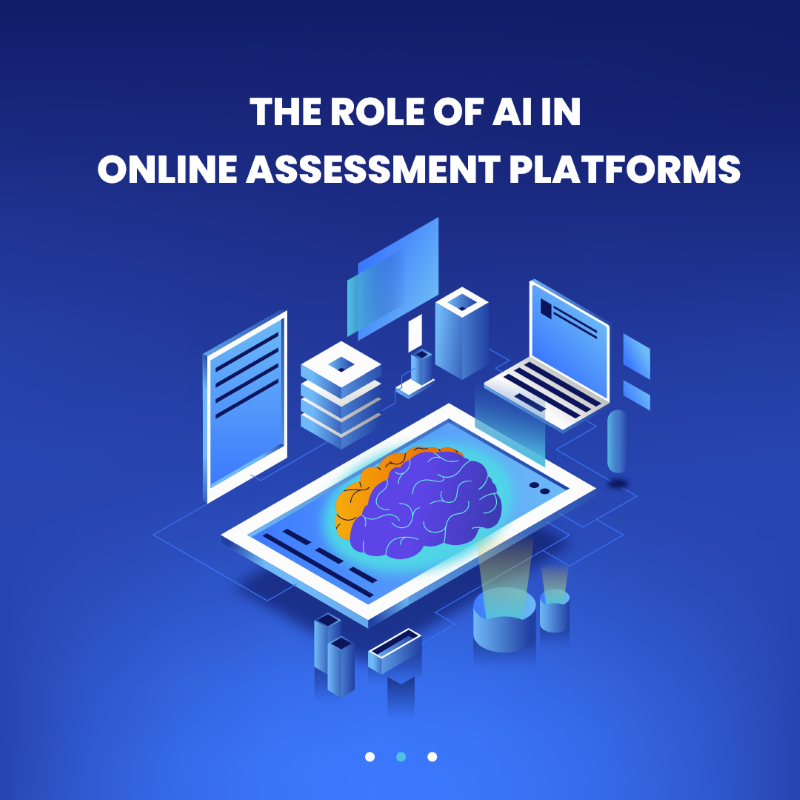
The Role of AI in Online Assessment Platforms
Introduction of AI in Online Assessment
The role of artificial intelligence in redefining the distribution of knowledge. But this article will focus on assessments—a single, very focused area of machine learning and the educational system. Let’s examine more closely at how this innovative technology is altering the planning and execution of examinations. We’ll highlight how AI is believable, individualized, timely, and economical.
Artificial intelligence (AI) has become a transformative force in various industries, and online assessment platforms are no exception. AI is reshaping the way assessments are conducted, evaluated, and leveraged for educational and professional purposes.
We will delve into the pivotal role of AI in online assessment platforms and its many implications.
1. Automated Grading and Feedback
AI enables automated grading of assessments. Whether it’s multiple-choice questions, essays, or even complex problem-solving tasks, AI algorithms can accurately and swiftly evaluate responses. This not only saves time for educators and employers but also provides immediate feedback to the test-takers, enhancing the learning and improvement process.
2. Personalized Assessments
AI can customize assessments based on individual skills, knowledge, and learning pace. By analyzing a test-taker’s previous performance and adapting the difficulty level of questions, AI ensures
that assessments are neither too easy nor too challenging, making them more effective in gauging the individual’s true capabilities.
3. Plagiarism Detection
For educational assessments, plagiarism is a significant concern. AI-powered tools can scan written responses to detect similarities with online sources, ensuring the integrity of the evaluation process.
4. Natural Language Processing (NLP)
AI, particularly NLP, plays a crucial role in assessing language proficiency, communication skills, and critical thinking. It can understand and evaluate the subtleties of human language, allowing for a deeper analysis of written and spoken responses.
5. Proctoring and Security
AI-based proctoring tools have revolutionized the security of online assessments. They can monitor test-takers through webcams, detect unusual behaviors, and flag potential cheating instances. This ensures the integrity of the assessment process.
6. Adaptive Testing
Adaptive testing, driven by AI, tailors assessments to an individual’s performance. If a test-taker answers a question correctly, the system presents a more challenging question, and vice versa. This dynamic approach optimizes the precision of assessments.
7. Insights and Analytics
AI-powered analytics provide valuable insights into the effectiveness of assessments. Educators and organizations can gain a deeper understanding of individual and group performance, identifying areas where additional support or training is needed.
8. Predictive Analysis
AI can predict future performance based on past assessment results. This is particularly valuable in educational settings, helping teachers and institutions identify students at risk of falling behind or excelling.
9. Streamlined Administration
AI automates administrative tasks related to assessments, from scheduling and managing test-taker data to generating reports and certificates. This reduces the burden on human administrators.
10. Continuous Improvement
AI continuously learns from assessment data and user interactions, improving its own algorithms. This results in better assessment platforms over time, with enhanced accuracy and efficiency.
11. Accessibility and Inclusivity
AI can assist in making assessments more accessible to individuals with disabilities. It can provide accommodations, such as text-to-speech or speech-to-text capabilities, to ensure that everyone has an equal opportunity to demonstrate their skills and knowledge.
12. Job Matching
In the context of recruitment and job placement, AI can analyze assessment results to match candidates with job opportunities that align with their skills and strengths, leading to better job-candidate fits.
AI in Online Assessments in the Future
Ultimately, it’s critical to consider its potential in online test software as well as how it should develop over time. Technology is expanding without boundaries and is only advancing to ever-higher levels of rendering excellence. In this context, it is noteworthy that developers of assessments are creating new concepts every other day and are eager to apply AI on a much larger scale.
The next step is to properly integrate open-ended questions with the online test platform so that AI may be used for evaluation in place of hand evaluation. One other development in the realm of online assessments is the ability to conduct interviews in real time during recruitment assessments.
In conclusion, AI has revolutionized online assessment platforms, making them more efficient, accurate, and personalized. This technology is not only a time-saver but also a game-changer in education, talent acquisition, and skills development. As AI continues to evolve, we can expect even more sophisticated and insightful assessment experiences in the future, benefitting both test-takers and those responsible for evaluation and decision-making.
futuremug is best Online Assessment Platform in Kerala |Bangalore | Chennai |Pune | Hyderabad | Delhi